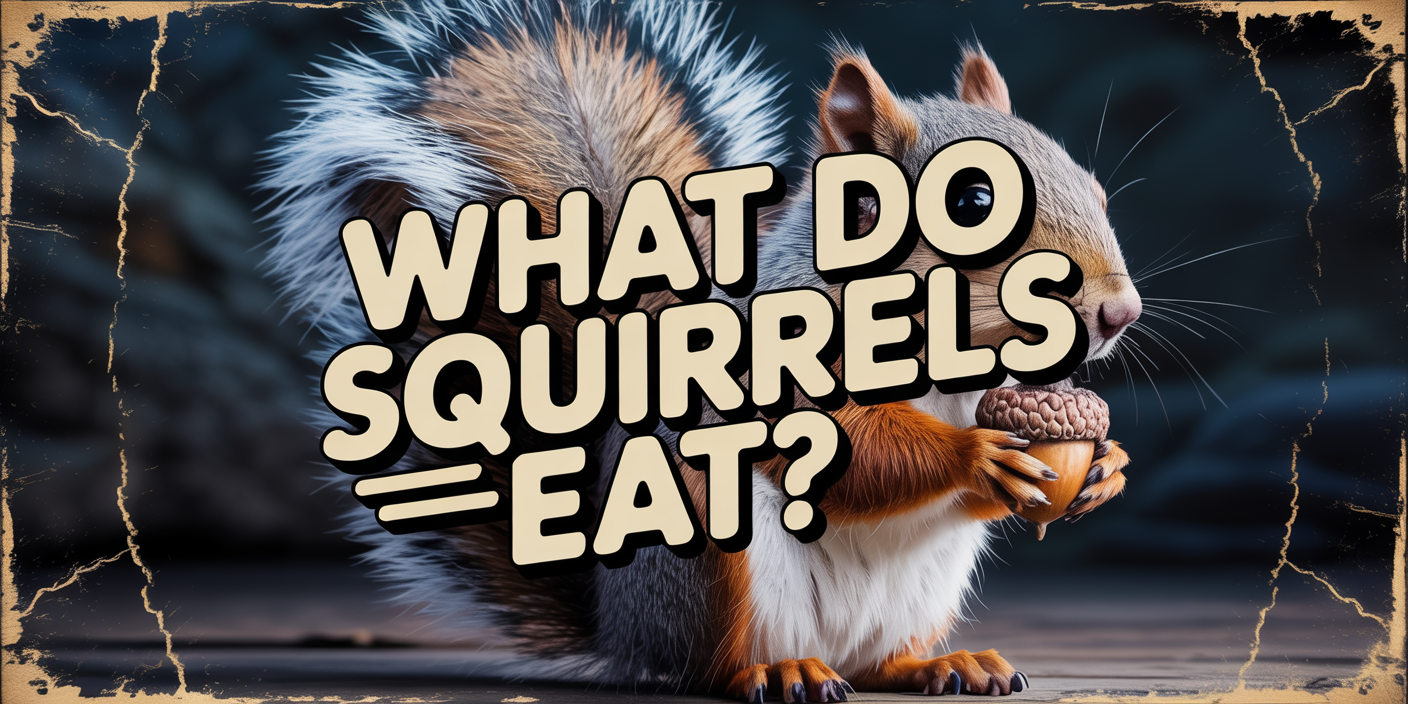“Squirrels eat nuts, seeds, fruits, vegetables, and sometimes insects or bird eggs. Their diet shifts with the seasons, and they often stash food for later.”
If you’ve ever watched a squirrel scurry across your yard or leap from tree to tree, you’ve probably wondered what fuels all that energy. These bushy-tailed foragers are known for their agility, curiosity, and nonstop snacking habits.
At AAAC Wildlife Removal, we’ve seen firsthand how a squirrel’s diet plays a big role in their behavior, especially when they start eyeing your garden, bird feeder, or attic for a free meal. Understanding what squirrels eat is more than just fun trivia, it’s key to keeping them from becoming a nuisance around your home.
Whether you’re trying to protect your vegetable patch or wondering why they keep showing up on your property, knowing their favorite foods can help you prevent unwanted visits. Let’s break down what’s really on the menu for squirrels and why their eating habits matter for Florida homeowners.
Nuts and Seeds
Nuts and seeds are staples in a squirrel’s diet and are often their top choice when foraging. Acorns, walnuts, pecans, hazelnuts, and sunflower seeds provide essential fats and protein that help squirrels stay energized and maintain a thick, healthy coat. You’ll often see them cracking shells open with their strong teeth or burying nuts in the ground to store for colder months.
This caching behavior not only ensures they have food later but also plays a role in forest regeneration, as forgotten nuts may sprout into new trees. In urban and suburban areas like Palm Bay, squirrels are quick to find bird feeders filled with sunflower seeds or peanuts, which can unintentionally encourage them to stick around.
Once they find a reliable food source, they’ll return frequently and may even start nesting nearby. At AAAC Wildlife Removal, we often receive calls from homeowners who notice squirrel activity increasing around their feeders or trees. Limiting access to easy food sources like unsecured feeders can help prevent squirrels from becoming too comfortable near your home.
Fruits and Berries
Squirrels have a sweet tooth, and fruits and berries are a juicy favorite, especially during warmer months when they’re in season. Apples, grapes, peaches, strawberries, and blueberries are commonly eaten, either foraged in the wild or swiped from backyard trees and gardens. These sugary treats provide quick energy thanks to their natural sugars, along with important vitamins and hydration.
Squirrels are nimble climbers, so they can easily reach high-hanging fruit before it hits the ground. In neighborhoods around Palm Bay, it’s common for squirrels to raid fruit trees or nibble on low-growing garden produce.
Homeowners often report half-eaten fruits left behind or visible bite marks on ripening crops. Covering fruit trees with netting or using motion-activated deterrents can help reduce this kind of activity. At AAAC Wildlife Removal, we encourage residents to harvest ripe produce promptly and secure compost bins to avoid attracting these crafty foragers.
Vegetables and Garden Crops
Squirrels won’t hesitate to help themselves to vegetables, especially if they’re easy to reach. Corn, tomatoes, squash, peas, and leafy greens are all fair game when a squirrel is hungry. They’ll often nibble just enough to ruin a crop without finishing it, which frustrates many backyard gardeners.
Their interest in vegetables increases during the summer and early fall when these crops are most abundant. In Palm Bay, we often see squirrels raiding vegetable gardens, even climbing fencing or chewing through netting to get inside.
They may also dig up newly planted seeds or young sprouts, disrupting your garden before it even takes off. If you’re growing your own food, consider installing raised beds with wire mesh lids or using spicy sprays made from natural ingredients to keep them away. AAAC Wildlife Removal can also offer tips on long-term deterrents if squirrels become a repeat problem.
Fungi and Mushrooms
Squirrels have a surprising taste for fungi and often seek out mushrooms growing in wooded or shaded areas. They rely on these as an important food source, especially in the fall when other resources begin to dwindle. Wild mushrooms offer a variety of nutrients, and squirrels seem to instinctively know which ones are safe to eat.
They’ll even dry mushrooms by placing them on tree branches to save for later, showcasing their clever food preservation habits. In the more wooded parts of Palm Bay, we’ve observed squirrels collecting fungi near oak trees, rotting logs, or damp landscaping.
While this behavior usually keeps them in the forest or backyard edges, it can still bring them close to homes with heavy tree coverage or shaded mulch beds. Though mushroom foraging doesn’t typically cause damage, their presence could signal high squirrel activity on your property. If you notice regular visits near your lawn or garden, AAAC Wildlife Removal can help assess the situation before it escalates.
Tree Bark, Twigs, and Leaves
When food is scarce or during winter months, squirrels resort to eating tree bark, tender twigs, and even leaves. While not their first choice, these fibrous materials provide some nutrition and help keep their continuously growing teeth in check. They often strip bark from branches or gnaw on tree trunks, which can stress or damage the tree over time.
This behavior is particularly common in colder months when other food sources become limited. Homeowners in Palm Bay may notice bark shavings on the ground or stripped limbs on ornamental or fruit trees.
This can be especially frustrating if the damage affects young saplings or decorative landscaping. Since squirrels use trees for both food and shelter, reducing access points like overhanging limbs near rooftops can help discourage this behavior. At AAAC Wildlife Removal, we often recommend trimming back tree branches and using tree guards to protect vulnerable trunks from excessive gnawing.
Why Call AAAC Wildlife Removal in Palm Bay?
Expert Squirrel Removal You Can Trust
If squirrels have become more than just a backyard curiosity, AAAC Wildlife Removal is here to help. Our team in Palm Bay specializes in humane squirrel removal that addresses both the immediate problem and long-term prevention. We handle everything from attic infestations to persistent garden raids, using proven techniques tailored to Florida homes and landscapes.
Full Property Inspection and Exclusion Services
We don’t just remove squirrels, we identify how they got in and stop them from coming back. Our exclusion services include sealing entry points, reinforcing vulnerable areas, and offering expert advice on how to make your property less inviting. From tree trimming tips to feeder management, we’ve got your squirrel-proofing covered.
Serving Palm Bay and Surrounding Communities
Whether you’re in Lockmar Estates, near Turkey Creek Sanctuary, or along the riverfront, we’ve helped homeowners across Palm Bay protect their property from nuisance wildlife. Our local expertise means we understand seasonal squirrel behavior and how it affects your home. Let AAAC Wildlife Removal keep your space safe, clean, and critter-free all year long.
Protecting Your Palm Bay Home from Squirrel Damage
Squirrels may look cute and playful, but their feeding habits can create real problems for homeowners in Palm Bay. From raiding bird feeders and gardens to gnawing on tree bark and electrical wires, these furry foragers are always on the hunt for their next meal.
Understanding what they eat; nuts, fruits, vegetables, fungi, and even bark, can help you spot early signs of squirrel activity and take preventative steps before the damage adds up. If you’re noticing chewed plants, scattered food scraps, or squirrels getting a little too comfortable on your property, it’s time to take action.
With the help of AAAC Wildlife Removal, you don’t have to face it alone. Our team offers expert support to remove squirrels safely and keep them out for good. Protect your home and your peace of mind by calling us today, we’re just a phone call away and ready to help.
Call AAAC Wildlife Removal Today!
If squirrels are causing damage around your home or property in Palm Bay, don’t wait for the problem to get worse. These clever critters can quickly turn a minor nuisance into major trouble by chewing through wires, nesting in attics, or digging up your garden.
At AAAC Wildlife Removal, we combine humane trapping methods with expert exclusion strategies to solve the problem for good. Our trained technicians know exactly how to locate entry points, remove squirrels safely, and keep them from coming back.
We proudly serve Palm Bay and nearby areas with fast response times and top-rated customer care. Whether you’re hearing scratching in your attic or spotting squirrel damage in your yard, we’re ready to step in and help.
Give us a call today to schedule a thorough property inspection and let us create a custom solution for your squirrel concerns. With AAAC Wildlife Removal on your side, you can finally enjoy a squirrel-free home with peace of mind.




